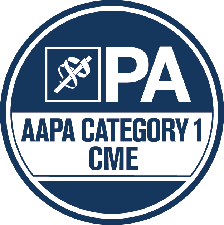Provided by HMP Education and Psychiatry Redefined, HMP Global Companies.
This training course is accredited for 3.0 credits (CME, CPE, CNE, AAPA, AANP, CPE for Dietitians, ASWB, APA, Participation).
FACULTY
James Greenblatt, MD
Founder, Psychiatry Redefined
Assistant Clinical Professor of Psychiatry
Tufts University School of Medicine
Boston, Massachusetts
[email protected]
PROVIDER STATEMENT
Provided by HMP Education and Psychiatry Redefined, HMP Global Companies.
INTENDED LEARNERS
This educational activity is specifically designed for healthcare and mental healthcare clinicians and professionals involved and/or interested in learning fundamental concepts underlying the functional medicine and nutritional approach to psychiatry and mental health.
LEARNING OBJECTIVES
After participating in this activity, learners should be better able to:
- Explore the association of negative mental health outcomes with ultra processed foods
- Examine the relationship between vitamin D, depression and suicide
- Describe the effects of omega-3 deficiency and omega-3 supplementation on mental health
- Explain the interrelationship between mental health, homocysteine and B vitamins
- Summarize the mental health benefits of low-dose lithium
- Describe the clinical relevance of magnesium deficiency and magnesium supplementation for mental health
ACTIVITY OVERVIEW
This groundbreaking and research-driven primer in Nutritional Psychiatry, presented by Dr. James Greenblatt, will provide the foundational knowledge and understanding necessary for clinicians to incorporate proven, evidence-based nutritional strategies into practice to enhance patient outcomes.
This on-demand webcast is available with synchronized slides and video/audio.
To be eligible for documentation of credit for each session attended, learners must participate in the activity and complete the activity evaluation. Participants who complete the evaluation online within active dates of the training will receive documentation of credit. Your certificate may not load if you are accessing it from a smartphone, or if your browser settings do not allow a new tab/window to open.
Once a certificate has been claimed, physicians and pharmacists may elect for credits to be submitted on their behalf to their boards via additional fields that will appear within the Claim Certificate page. Credits must be submitted through this process to be reported to the American Board of Surgery and the National Association of Boards of Pharmacy.
Release Date: December 10, 2025
Expiration Date: December 31, 2026
Estimated Time to Complete: 3 hours
There is no fee for current Psychiatry Redefined Fellows or members. This on-demand activity is included for those who enroll in he Fundamentals of Nutritional Psychiatry program for $249.
HARDWARE/SOFTWARE REQUIREMENTS
The activity is best supported via a computer or device with current versions of the following browsers: Mozilla Firefox, Google Chrome, or Safari. A PDF reader is required for print publications.
CONTINUING EDUCATION

In support of improving patient care, this activity has been planned and implemented by HMP Education and Psych Redefined. HMP Education is jointly accredited by the Accreditation Council for Continuing Medical Education (ACCME), the Accreditation Council for Pharmacy Education (ACPE), and the American Nurses Credentialing Center (ANCC), to provide continuing education for the healthcare team.
Note: This statement is not an indication of approved credits. Please see below for full accreditation details, including credit types and totals, for this activity.
PHYSICIANS
HMP Education designates this internet enduring activity for a maximum of 3.00 AMA PRA Category 1 Credits™. Physicians should claim only the credit commensurate with the extent of their participation in the activity.
PHARMACISTS
This internet enduring, knowledge-based activity (Universal Activity Number: JA0006201-9999-24-184-H01-P) has been approved for a maximum of 3.00 contact hours (0.30 CEUs).
Note: The certificate is not the official record of your participation in the activity. The official record of credit will be the information in the CPE Monitor system. Following ACPE Policy, credit must be transmitted to NABP through CPE Monitor within 60 days from the date you complete this CPE activity
NURSES
This continuing nursing education internet enduring activity awards 3.00 contact hours. Provider approved by the California Board of Registered Nursing, Provider #18006, for 3.00 contact hours.
NURSE PRACTITIONERS
American Academy of Nurse Practitioners National Certification Program accepts AMA PRA Category 1 CreditTM from organizations accredited by the ACCME.
PHYSICIAN ASSOCIATES/ASSISTANTS

HMP Education has been authorized by the American Academy of PAs (AAPA) to award AAPA Category 1 CME credit(s) for activities planned in accordance with the AAPA CME Criteria. This internet enduring activity is designated for 3.00 AAPA Category 1 credits. Approval is valid until December 31, 2026. PAs should only claim credit commensurate with the extent of their participation.
DIETITIANS

PSYCHOLOGISTS

Continuing Education (CE) credits for psychologists are provided through the co-sponsorship of the American Psychological Association (APA) Office of Continuing Education in Psychology (CEP). The APA CEP Office maintains responsibility for the content of the programs. This enduring activity awards 3.00 CE Credits.
SOCIAL WORKERS
As a Jointly Accredited Organization, HMP Education is approved to offer social work continuing education by the Association of Social Work Boards (ASWB) Approved Continuing Education (ACE) program. Organizations, not individual courses, are approved under this program. Regulatory boards are the final authority on courses accepted for continuing education credit. Social workers completing this internet enduring course receive 3 general continuing education credits.
USE OF PROPRIETARY NAMES
This continuing medical education activity may include device or medicine brand names for participant clarity purposes only, due to the presence of different branded versions of the same product. No product promotion or recommendation should be inferred.
UNAPPROVED AND/OR INVESTIGATIONAL USES OF DRUGS AND DEVICES
This activity may contain information about experimental and other uses of drugs or devices that are not currently approved by the European Medicines Agency (EMA) of the European Union or the Food and Drug Administration (FDA) of the United States. Participants are strongly encouraged to consult approved product labeling for any drug or device mentioned in this activity before use. The opinions expressed during this activity are the opinions of the respective authors, presenters, or moderators and do not necessarily reflect the opinions of HMP Education.
DISCLAIMERS
The material presented and related discussions are not intended to be medical advice, and the presentation or discussion of such material is not intended to create and does not establish a provider-patient relationship. Medical advice of any nature should be sought from an individual’s own healthcare provider.
The opinions expressed in this educational activity are those of the faculty and are not attributable to HMP Global or any of its subsidiaries or affiliates. Clinical judgment must guide each professional in weighing the benefits of treatment against the risk of toxicity. Dosages, indications, and methods of use for products referred to in this activity are not necessarily the same as indicated in the package insert for each product, may reflect the clinical experience of the presenters, and may be derived from the professional literature or other clinical sources. Consult complete prescribing information before administering.
DISCLOSURE OF RELEVANT FINANCIAL RELATIONSHIPS
HMP Education is an independent provider of continuing medical education. HMP Education has no proprietary or financial interest in medical or healthcare products over which the FDA (USA) or EMA (EU) has regulatory authority.
In accordance with our disclosure policies, HMP Education is committed to ensuring balance, independence, objectivity, and scientific rigor for all accredited continuing education. These policies include assigning relevance to and mitigating all perceived or real relevant financial relationship (conflicts of interest) between any individual with control over the content and any ineligible company (commercial interest) as defined by the ACCME and CPME.
Any individual with control over accredited content, including planner, faculty, and reviewer, is required to globally disclose:
- Individual relationship(s) or lack thereof, and its nature, with any/all ineligible company, and;
- Any investigational, off-label, or non-FDA approved content or discussion
HMP Education has reviewed these disclosures, assigned relevance based on the relationship and scope of content, and identified those with the potential to compromise the goals and educational integrity of the education. Relevant relationships, or lack thereof, are shared with the learner.
Education has been independently peer-reviewed to validate content, mitigate identified financial relationships (conflicts of interest), and ensure:
- All recommendations involving clinical medicine are based on evidence that is accepted within the medical profession as adequate justification for their indications and contraindications in the care of patients.
- All scientific research referred to, reported, or used in accredited continuing education in support or justification of a patient care recommendation conforms to generally accepted standards of experimental design, data collection, and analysis.
- Content is appropriate, fair and balanced, unbiased, referenced, and non-promotional.
All relevant financial relationships have been mitigated.
FACULTY
James Greenblatt, MD: Speaker—Pure Encapsulations; Founder & Author Royalties—Psychiatry Redefined
PLANNING COMMITTEE
Planning for this activity was conducted by faculty advisors. To further support the development of the content, additional information regarding professional roles, responsibilities, and teamwork was gathered through survey input from our target audience and/or a comprehensive literature review.
HMP Education planners and staff include Heather Getz; Brielle Calleo; James Greenblatt, MD; Samantha Joy; Randy Robbin; and Andrea Zimmerman, EdD, CHCP.
James Greenblatt, MD: Speaker—Pure Encapsulations; Founder & Author Royalties—Psychiatry Redefined
No other HMP Education staff has disclosed a relevant financial relationship with any ineligible company (commercial interest).
ADA STATEMENT
HMP Education complies with the legal requirements of the Americans with Disabilities Act and the rules and regulations thereof. Any participant in this educational activity who needs accommodation(s) may submit a request to the support team.
PRIVACY POLICY
HMP Education protects the privacy of personal and other information regarding participants, educational partners, and joint providers. HMP Education and our joint providers will not release personally identifiable information to a third party without the individual’s consent, except such information as is required for reporting purposes to the appropriate accrediting agency. HMP Education maintains physical, electronic, and procedural safeguards that comply with federal regulations to guard your nonpublic personal information.
COMMERCIAL SUPPORT
No commercial interest provided financial support for this continuing education activity.
CONTACT US
For immediate assistance, please explore our HMP Education Help Center or chat with our Virtual CE Assistant, which can answer most common questions related to claiming credits and the HMP Education website. If you have a question or grievance that cannot be answered by our Virtual CE assistant and Help Center, please contact the support team. Our accreditation and compliance team will respond to your inquiry within one business day.
Copyright © 2025 by HMP Education. All rights reserved. No part of this accredited continuing education activity may be reproduced or transmitted in any form or by any means, electronic or mechanical, without first obtaining permission from HMP Education.








